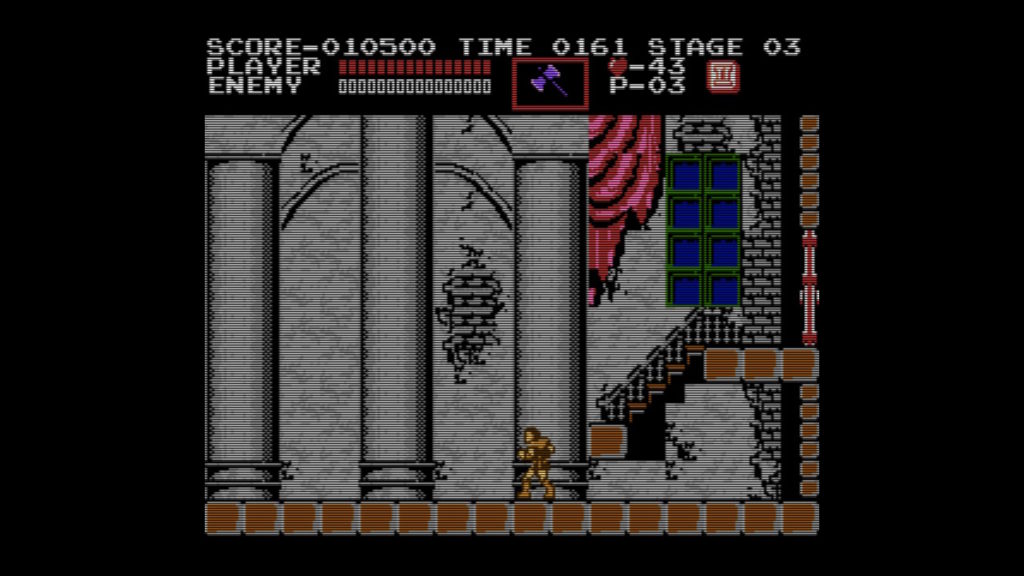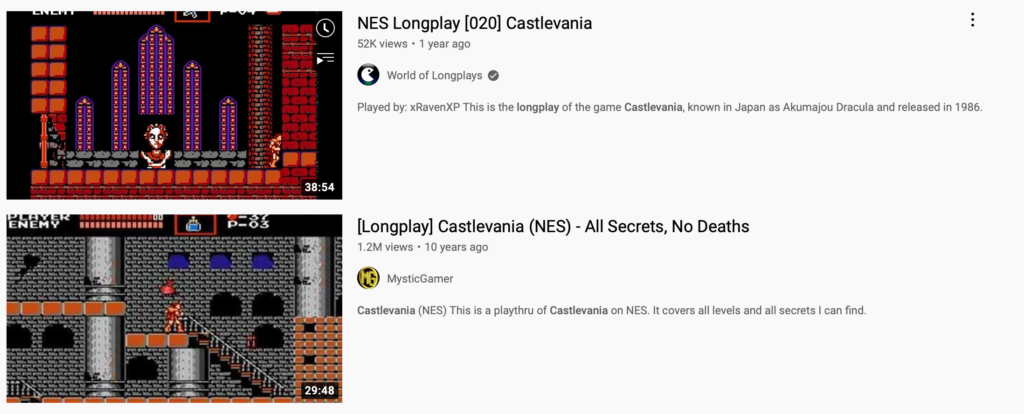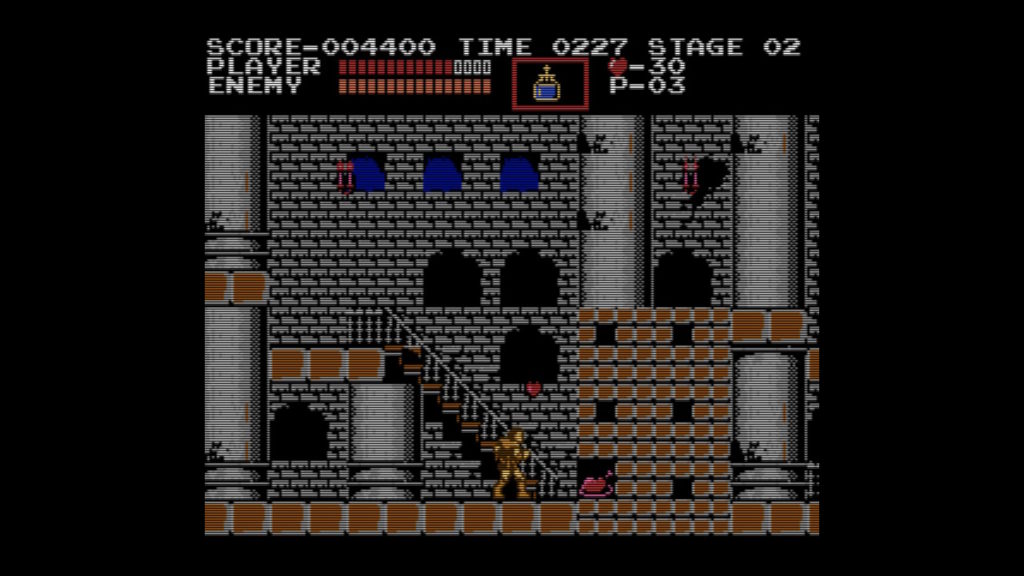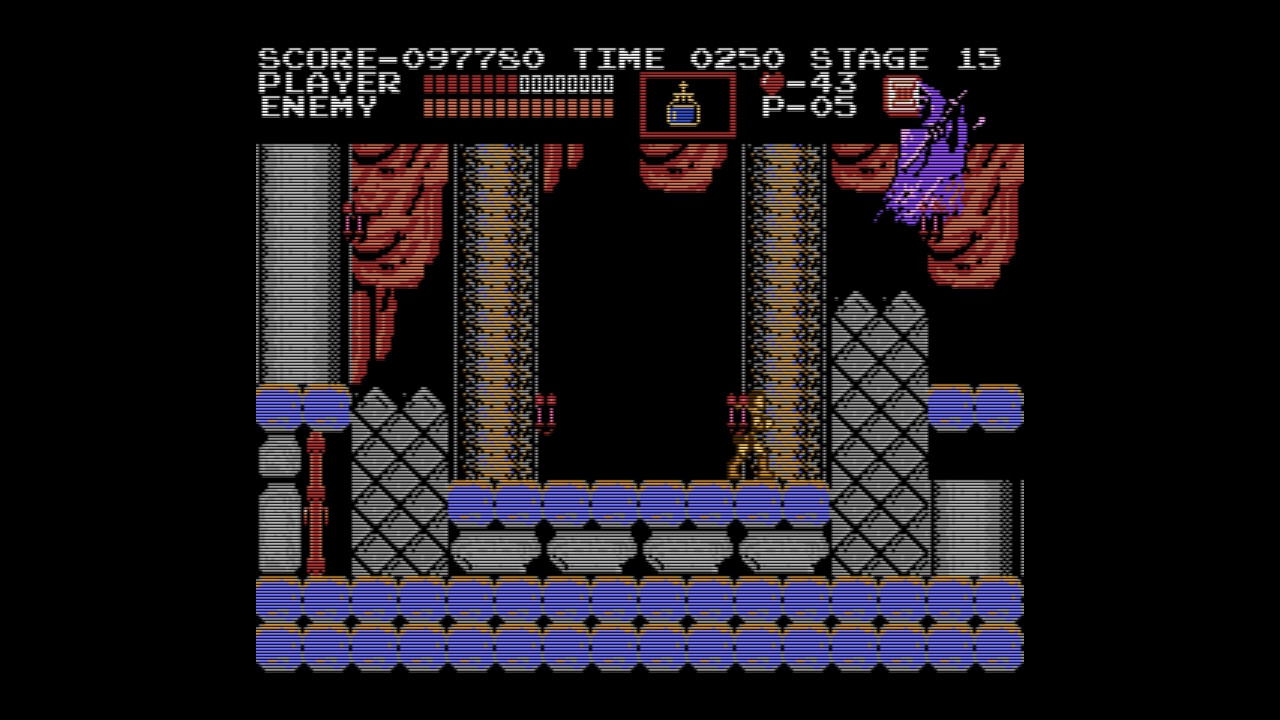
Why do people play “hard” video games? Is it out of a complex to prove themselves? Is it enjoyment of the game’s mechanics, regardless of difficulty? Is it simply masochism? Who cares, it doesn’t matter. I’m here to tell you that I haven’t beat Castlevania yet, and that it’s great. (Or at least, what I’ve played.)
Before I get into the meat of the review, I’m sorry to anyone reading this. A game deserves better than a reviewer who can’t finish it. If you disagree, I will challenge you on it. Meet me at the arcade, Street Fighter 2 Turbo, no Akuma. (Granted, I haven’t played Turbo, but I have immense pride and an illogical amount of pertinacity.) While the average enjoyer of a game is certainly entitled to have their opinion on whatever piece of the game they could get through, a reviewer is held to higher standards, for any piece of media. They should be at a minimum, aware of the context behind the work, and have observed every piece of it, at least to the degree that they can characterize it fully. For most games, that means finishing it, at a minimum, especially for a game where longplays take 30-40 minutes at most. I estimate I have spent about 5 hours on Castlevania, and I can’t beat Stage 15 of 18.

I had two options when I decided to get things ready for a review two weeks ago. I could either review a game I don’t have access to (Metal Gear), or I could review a new game entirely. I decided to make this review Count (see what I did there?) I chose this, mainly because of a single quip I had made in a conversation with a friend.
In all honesty, I should have expected this coming in. I got a bit cocky after beating Mega Man 7-11, and I assumed this game would be difficult but doable. I was completely right. I just haven’t had enough time to put in.
It’s probably worth explaining why I would think playing “modern” Mega Man games would translate into a completely different franchise. First: Mega Man has not aged like other games. Each mainline Mega Man game is roughly the same difficulty, and 9 and 10 are meant to look and play like their NES counterparts. Second, and I know this sounds strange, but Mega Man release dates are very widely spread. 7 was in ’95, 8 was in ’97, 9 and 10 were in the late 2000s, and 11 came out in 2018. These are not “modern” games, and are still regarded as “Nintendo Hard.”
Second, I need to explain what “Nintendo Hard” is, and why that would prepare me. Nintendo Hard games are what people used to think of/complain about when they said video games were too hard for them. The name comes from the tendency of NES platformers to be unforgivingly difficult. Hard to dodge enemies, sometimes with patterns you could only dodge with advance knowledge. Slow jumping, awkward controls, y-axis locked attacks, all wrapped up with a life system, and when you’re out, it’s game over, use a continue if you can.
Anyhow, Mega Man has that in spades. It’s so charming… wait a minute.
Castlevania has that in spades! In some ways, it’s arguably worse in this regard than any of the Mega Man games. While platforming isn’t the most essential in Castlevania there is no mid-air maneuverability to speak of. The attacks are even more locked to the y-axis, with only two bonus weapons even having the potential to do otherwise (The axe and firebomb/holy water.) Just like Mega Man, there are enemies that pop up midair above holes in the ground, making it so that if they touch you, you fall, stunned, to your death even at full health. Most stages don’t have healing items.

That said, when I played Castlevania, and this might sound strange after everything I just explained about difficulty, it felt so easy and gentle. (Perhaps due to my prior experience) I would argue its opening levels are easier than Super Mario Bros., and though it ramps up a bit, it does a good job of easing the player into this difficulty. When I first died, I hadn’t even realized that I had already passed 3 checkpoints!
Simon Belmont feels great to play. He’s powerful, especially after you upgrade his signature whip, the Vampire Killer to its max length. I cannot understate how much fun it is to use a whip in a game like this. It has all the precision and speed of a melee weapon, but all the range you need to get an extra shot at a particularly dextrous foe. As an especially helpful added bonus, it even cancels all enemy projectiles. The game is entirely playable using only the whip. The subweapons Simon can use range from a stopwatch that can let him pull a Star Platinum, to knives, uh… ok.
Sidenote: what was with the localization to this game? Why are firebombs “more appropriate” than holy water? Why are what are clearly silver crosses called “boomerangs?”
The bosses are difficult but fair. I never felt like I was not at fault for any of my deaths, except for a single gripe with controls. For some inexplicable reason, Konami mapped two actions to the up direction on the d-pad, and two to the down direction. Using a subweapon on the stairs is an exercise in aggravation, and don’t even try to crouch. Stairs suck.
Anyhow, this leads me to the main point. I can’t beat death. Sorry, I mean I can’t beat Death. He’s the boss of Stage 15, and I tried to consult back issues of Nintendo Power, but they weren’t any help. I’ve been stuck for days. Any tips? I’ll just keep trying in the mean time, since I got him to half health once.

But seriously, I should probably give my thoughts on game difficulty after leading you on like this. I think I enjoy playing games like this since I don’t really get angry at things. If something bad happens, and I don’t need to be mad at any person in particular, I channel it to a fleeting disappointment. I’ve had years of practice, and taken mindfulness courses. So I don’t think it’s masochism that motivates me here.
You can probably already guess that one of my biggest motivations is the sheer joy of play. I like playing Simon. I like navigating through Castlevania. The controls are still relatively crisp, the graphics do their job, and I can even enjoy the feeling of make-believe when I play. (Confession. I spent a good 10 minutes the other night pretending to swing an imaginary whip.) The added difficulty makes the play feel better, like how a punching bag makes your punches feel real. A little bit of frustration helps hone your will to get better, like a hint of cinnamon in apple cider.
Considering the last of the three motivations at the beginning, I do want to finish Castlevania for its own sake. I would like to be able to say I completed it. But that is only a part of my overall feelings. I would not mind putting it aside for a while and coming back.
To conclude, Castlevania is a good game. Play it, get a little frustrated, and enjoy that frustration. You won’t find many games like it today.
